人教版英语八年级下册Unit4 Why don't you talk to your parents?Section A知识点
文档属性
| 名称 | 人教版英语八年级下册Unit4 Why don't you talk to your parents?Section A知识点 | 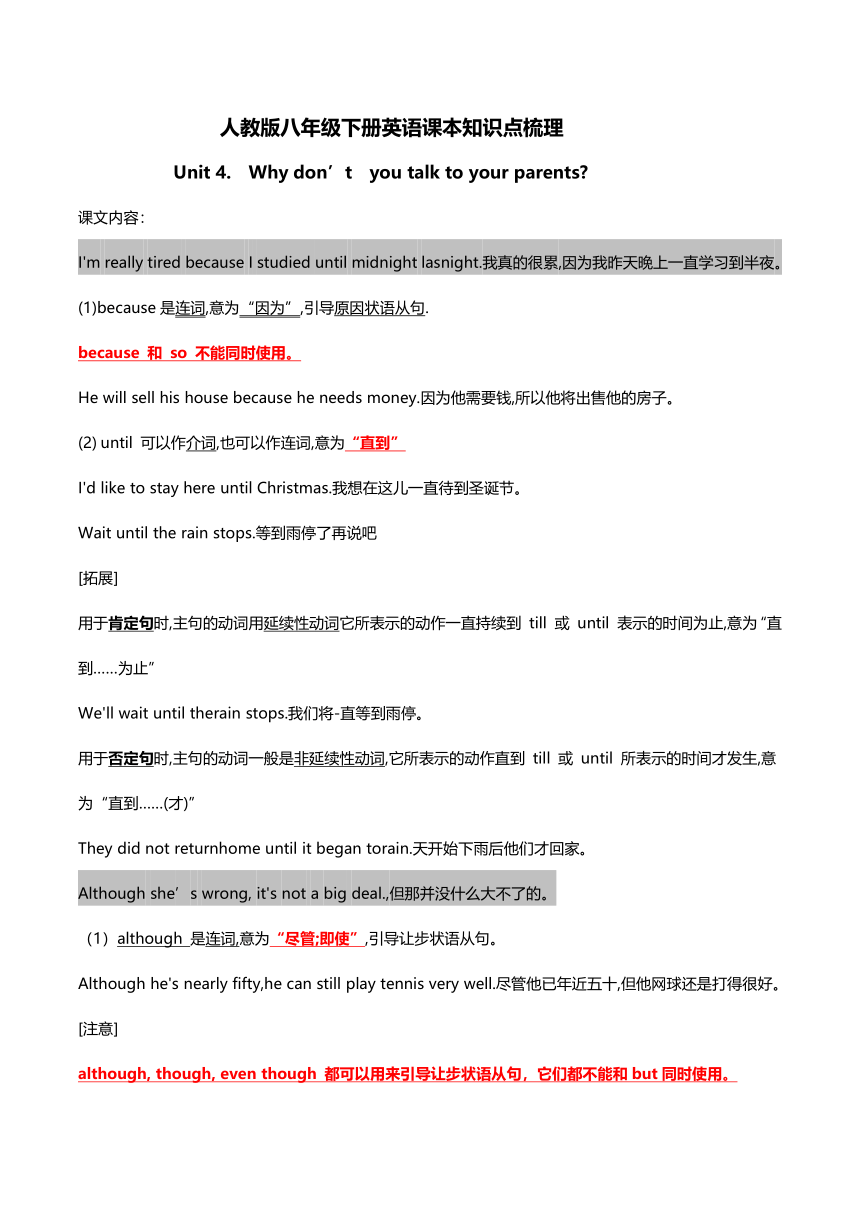 | |
| 格式 | docx | ||
| 文件大小 | 31.9KB | ||
| 资源类型 | 教案 | ||
| 版本资源 | 人教新目标(Go for it)版 | ||
| 科目 | 英语 | ||
| 更新时间 | 2024-04-02 18:05:43 | ||
图片预览

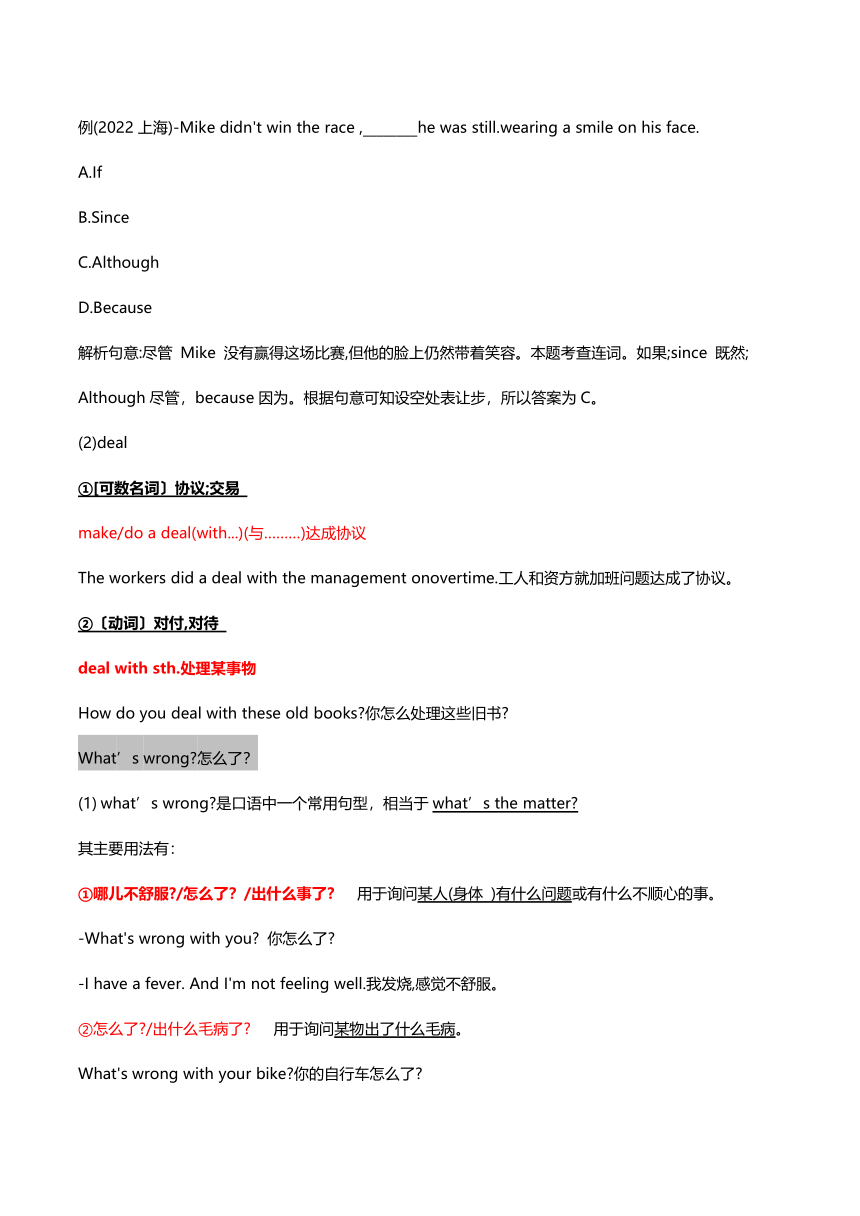
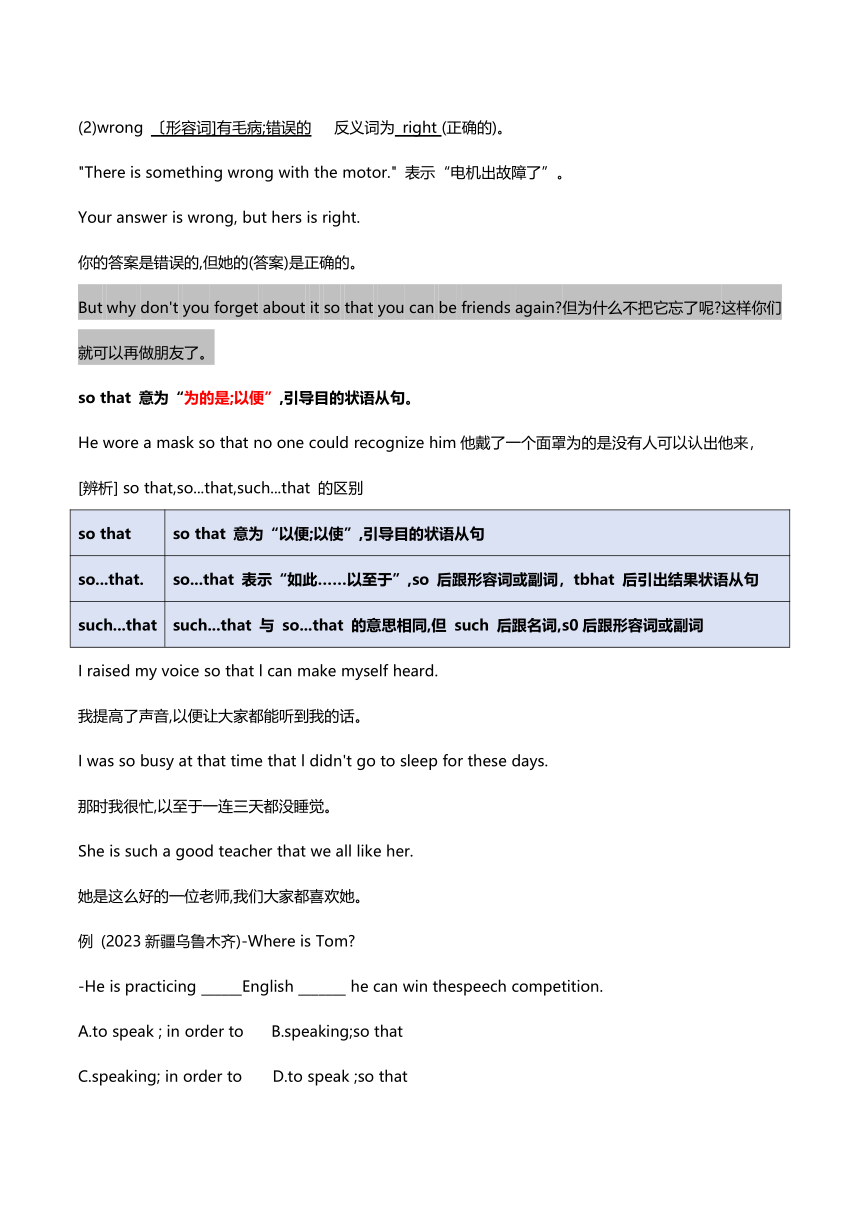
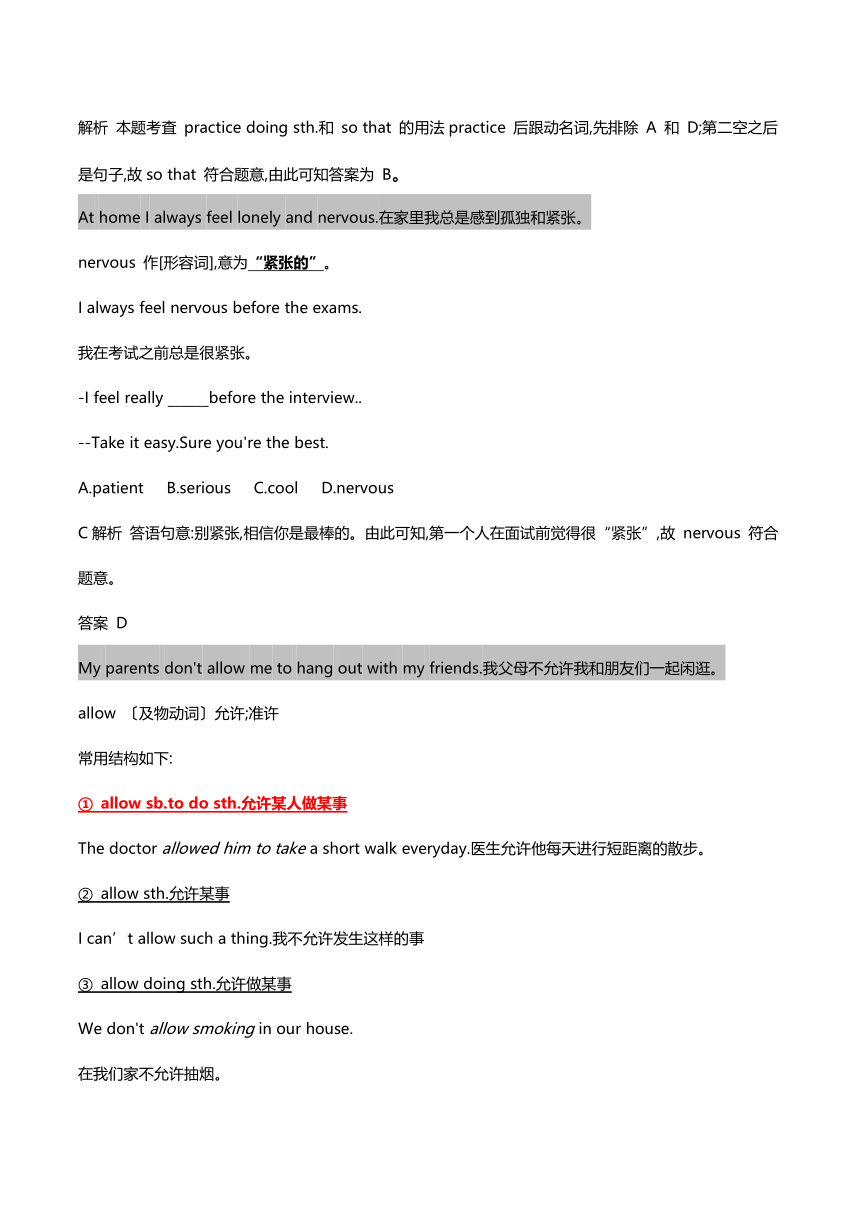
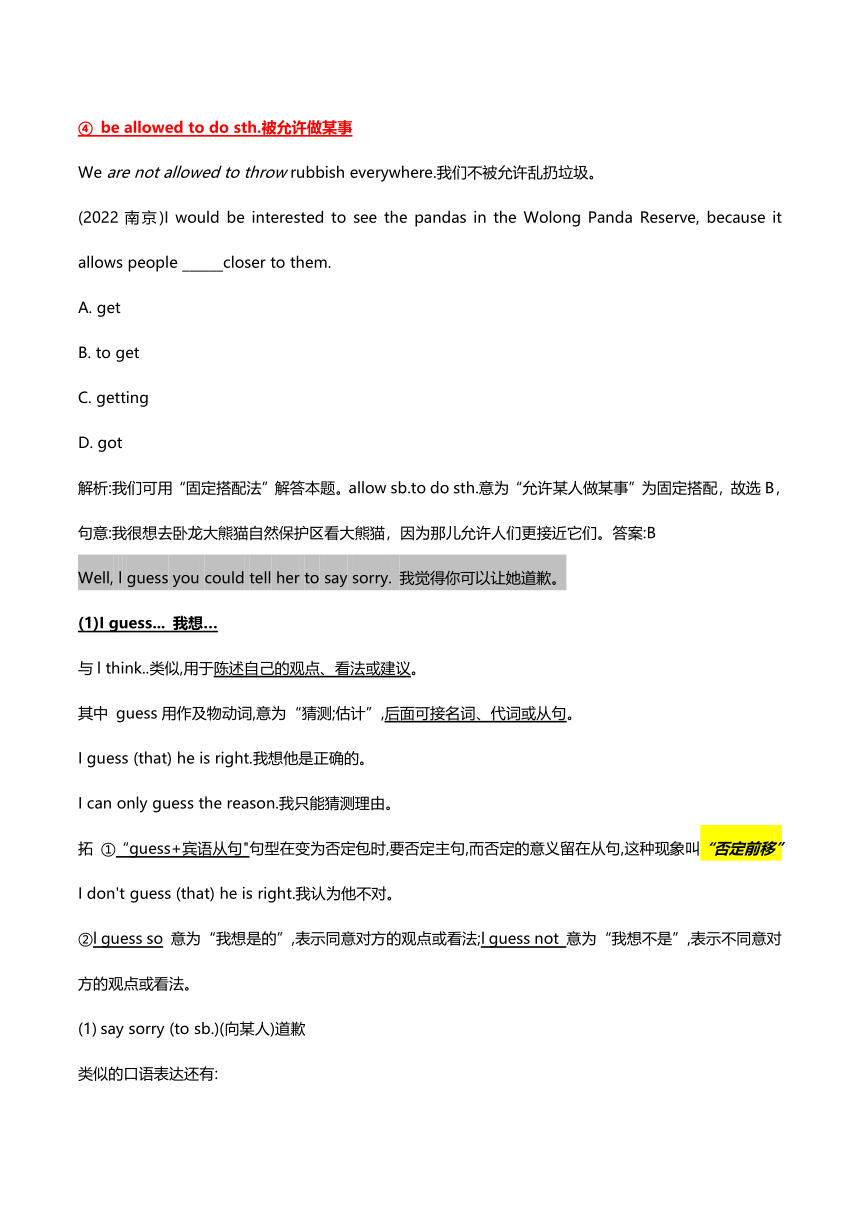
文档简介
人教版八年级下册英语课本知识点梳理
Unit 4. Why don’t you talk to your parents
课文内容:
I'm really tired because I studied until midnight lasnight.我真的很累,因为我昨天晚上一直学习到半夜。
(1)because是连词,意为“因为”,引导原因状语从句.
because 和 so 不能同时使用。
He will sell his house because he needs money.因为他需要钱,所以他将出售他的房子。
until 可以作介词,也可以作连词,意为“直到”
I'd like to stay here until Christmas.我想在这儿一直待到圣诞节。
Wait until the rain stops.等到雨停了再说吧
[拓展]
用于肯定句时,主句的动词用延续性动词它所表示的动作一直持续到 till 或 until 表示的时间为止,意为“直到……为止”
We'll wait until therain stops.我们将-直等到雨停。
用于否定句时,主句的动词一般是非延续性动词,它所表示的动作直到 till 或 until 所表示的时间才发生,意为“直到……(才)”
They did not returnhome until it began torain.天开始下雨后他们才回家。
Although she’s wrong, it's not a big deal.,但那并没什么大不了的。
(1)although 是连词,意为“尽管;即使”,引导让步状语从句。
Although he's nearly fifty,he can still play tennis very well.尽管他已年近五十,但他网球还是打得很好。[注意]
although, though, even though 都可以用来引导让步状语从句,它们都不能和but同时使用。
例(2022上海)-Mike didn't win the race ,________he was still.wearing a smile on his face.
A.If
B.Since
C.Although
D.Because
解析句意:尽管 Mike 没有赢得这场比赛,但他的脸上仍然带着笑容。本题考查连词。如果;since 既然;
Although尽管,because因为。根据句意可知设空处表让步,所以答案为C。
(2)deal
①[可数名词〕协议;交易
make/do a deal(with...)(与………)达成协议
The workers did a deal with the management onovertime.工人和资方就加班问题达成了协议。
②〔动词〕对付,对待
deal with sth.处理某事物
How do you deal with these old books 你怎么处理这些旧书
What’s wrong 怎么了?
what’s wrong 是口语中一个常用句型,相当于what’s the matter
其主要用法有:
①哪儿不舒服 /怎么了?/出什么事了 用于询问某人(身体 )有什么问题或有什么不顺心的事。
-What's wrong with you 你怎么了
-I have a fever. And I'm not feeling well.我发烧,感觉不舒服。
②怎么了 /出什么毛病了 用于询问某物出了什么毛病。
What's wrong with your bike 你的自行车怎么了
(2)wrong 〔形容词]有毛病;错误的 反义词为 right (正确的)。
"There is something wrong with the motor." 表示“电机出故障了”。
Your answer is wrong, but hers is right.
你的答案是错误的,但她的(答案)是正确的。
But why don't you forget about it so that you can be friends again 但为什么不把它忘了呢 这样你们就可以再做朋友了。
so that 意为“为的是;以便”,引导目的状语从句。
He wore a mask so that no one could recognize him他戴了一个面罩为的是没有人可以认出他来,
[辨析] so that,so...that,such...that 的区别
so that so that 意为“以便;以使”,引导目的状语从句
so...that. so...that 表示“如此……以至于”,so 后跟形容词或副词,tbhat 后引出结果状语从句
such...that such...that 与 so...that 的意思相同,但 such 后跟名词,s0后跟形容词或副词
I raised my voice so that l can make myself heard.
我提高了声音,以便让大家都能听到我的话。
I was so busy at that time that l didn't go to sleep for these days.
那时我很忙,以至于一连三天都没睡觉。
She is such a good teacher that we all like her.
她是这么好的一位老师,我们大家都喜欢她。
例 (2023新疆乌鲁木齐)-Where is Tom
-He is practicing ______English _______ he can win thespeech competition.
A.to speak ; in order to B.speaking;so that
C.speaking; in order to D.to speak ;so that
解析 本题考査 practice doing sth.和 so that 的用法practice 后跟动名词,先排除 A 和 D;第二空之后是句子,故so that 符合题意,由此可知答案为 B。
At home I always feel lonely and nervous.在家里我总是感到孤独和紧张。
nervous 作[形容词],意为“紧张的”。
I always feel nervous before the exams.
我在考试之前总是很紧张。
-I feel really ______before the interview..
--Take it easy.Sure you're the best.
A.patient B.serious C.cool D.nervous
C解析 答语句意:别紧张,相信你是最棒的。由此可知,第一个人在面试前觉得很“紧张”,故 nervous 符合题意。
答案 D
My parents don't allow me to hang out with my friends.我父母不允许我和朋友们一起闲逛。
allow 〔及物动词〕允许;准许
常用结构如下:
① allow sb.to do sth.允许某人做某事
The doctor allowed him to take a short walk everyday.医生允许他每天进行短距离的散步。
② allow sth.允许某事
I can’t allow such a thing.我不允许发生这样的事
③ allow doing sth.允许做某事
We don't allow smoking in our house.
在我们家不允许抽烟。
④ be allowed to do sth.被允许做某事
We are not allowed to throw rubbish everywhere.我们不被允许乱扔垃圾。
(2022南京)I would be interested to see the pandas in the Wolong Panda Reserve, because it allows people ______closer to them.
A. get
B. to get
C. getting
D. got
解析:我们可用“固定搭配法”解答本题。allow sb.to do sth.意为“允许某人做某事”为固定搭配,故选B,句意:我很想去卧龙大熊猫自然保护区看大熊猫,因为那儿允许人们更接近它们。答案:B
Well, l guess you could tell her to say sorry. 我觉得你可以让她道歉。
(1)I guess... 我想…
与l think..类似,用于陈述自己的观点、看法或建议。
其中 guess用作及物动词,意为“猜测;估计”,后面可接名词、代词或从句。
I guess (that) he is right.我想他是正确的。
I can only guess the reason.我只能猜测理由。
拓 ①“guess+宾语从句"句型在变为否定包时,要否定主句,而否定的意义留在从句,这种现象叫“否定前移”I don't guess (that) he is right.我认为他不对。
②l guess so 意为“我想是的”,表示同意对方的观点或看法;l guess not 意为“我想不是”,表示不同意对方的观点或看法。
say sorry (to sb.)(向某人)道歉
类似的口语表达还有:
say hello/hi to... 向……表示问候;问候…
say thanks to... 向……致谢;感谢…....
say goodbye to... 向……道别
I'm wrong.I say sorry to you.我错了,我向你道歉
Well, I found my sister looking through my things yesterday..,昨天我发现我妹妹在翻看我的东西。
find sb.doing sth.发现某人正在做某事doing sth. 作宾语补足语,表示动作正在进行
I found Jimmy sweeping the foor when l got into the classroom this morning.
今天早上我进教室的时候发现吉米正在扫地
(2)look through 快速查看;浏览 through 为介词,后接物作宾语
Look through your notes before the exam.
考试前快速查看你的笔记。
Look through the passage quickly and answer the questions.快速浏览文章,并回答问题。
Hope things work out. 希望事情会好起来。
work out (“动词+副词”结构)
①成功地发展
相当于不及物动词,不带宾语。后可跟 fine,well,badly 等词,表明产生的结果如何。
I hope everything works out. 我希望事事如意。
②解决(问题)
Don't worry. Things will work out.别担心,事情会解决的。
③算出
I believe you can work out this math problem by yourself. 我相信你能独自算出这道数学题。
④制订;拟出
The outline must be carefully worked out.
这个提纲一定要仔细拟订。
When they argue, it's like a big, black cloud hanging over our home.当他们争吵时,就像大片乌云笼罩在我们家上空。
(1)argue〔不及物动词〕争吵;争论
名词形式为 argument,意为“争论”
argue with sb.与某人争论
argue about sth.就某事争论
argue with sb.about sth.为某事与某人争论
The boy argued with his mother about his homework.那个男孩就家庭作业(的问题)与他妈妈争吵起来Don't argue about this matter any more.不要再为这件事争论了。
(2)cloud 〔可数名词〕云;云朵 其形容词形式为 cloudy,意为“多云的”。
Look at the black clouds in the sky. It's going "rain.看天上的乌云,要下雨了。
(3)现在分词(短语)作后置定语
hanging over our home是现在分词短语作后置定语,修饰cloud.
The boy looking at the picture is my elder brothel正在看图片的那个男孩是我的哥哥。
lf your parents are having problems, you should offer to help.如果你的父母遇到问题,你应该主动提供帮助。
辨析:offer 与 provide
两者都可作及物动词,意为“提供”,但用法不同
offer: 主动提出;自愿给子;提供
offer sb. sth.= offer sth. to sb..意为“提供给某人某物”,offer to do sth.意为“主动提出做某事’
provide 提供;供应 provide sth.for sb.= provide sb. with sth.= ,意为“提供给某人某物”
She offered me a job.= She offered a job to me.她提供给我一份工作。
The school provided food for the students.=The school provided the students with food!
学校为学生们提供伙食
习题
(2021辽宁丹东)How's it going, Tina -Great. My company has _____me a good job.
A. offered B. provided C. introduced D. discovered
解析:我们可用“辨析法”解答本题。offer“提供”;provide“提供;供应”;introduce“介绍”;discover“发现”。由句中 company(公司)及job(工作)可知此处意为“我公司给我提供了一份好工作”,故排除C、D两项。offer 后可接双宾语,即 ofer sb.sth(提供给某人某物),而provide后不能接双宾语;由空后的 me a goodjob 为双宾语可知选 offered。答案:AI
Secondly, why don't you sit down and communicate with your brother 其次,你为什么不坐下来和你的哥哥沟通呢
secondly 〔副词]第二;其次
常与 firstly(第一,首先),thirdly(第三),lastly(最后)等词连用,表示列举事实或理由等
As students , firstly, we should obey the school rules ;secondly, we should listen carefully in class; lastly we should finish our homework on time.
作为学生、第一,我们应该遵守校规;第二,在课堂上我们应该认真听讲;最后,我们应该按时完成家庭作业。
communicate with sb. 和某人交流/沟通
其中 communicate 用作不及物动词,意为“交流:沟通”,其名词形式为communication(交流,沟通)。
I often communicate with him on the phone.我经常和他在电话里交流。
People use languages to communicate.人们用语言来交流。
You should explain that you don't mind him watching TV all the time. 你应该(向他)说明你不介意他总是看电视。
explain 〔动词〕解释;说明 其后可跟名词从句或“疑问词+动词不定式”结构。
explain sth.to sb.向某人解释某事/某物
Could you explain the meaning of the word 你能解释一下这个单词的意思吗
Please explain this point to me.请给我解释一下这一点
单词填空
Judy was late for class and e______the reason to the teacher.
解析:我们可用“逻辑推理法”解答本题。由上文语意“朱迪上课迟到了”可推知,此处表示“向老师解释原因”;explain 意为“解释”由上文的 was 可知,此处应用一般过去时,故填过去式 explained。答案:explained
make sth.clear 使某事清楚易懂
clear 〔形容词]
①清楚易懂的
可在句中作定语、表语或宾语补足语。其副词形式 clearly 意为“清楚地,明白地”。
The question is very clear.这个问题很清楚。
Do I make myself clear 我讲清楚了吗
②晴朗的
It was a clear morning.那是个晴朗的上午。
③畅通无阻的
The road was clear and l ran over.
路上没有东西挡着,我就跑了过去。
You left your homework at home,你把家庭作业忘在家里了。
(1)leave (let,let) [及物动词〕忘了带;丢下
leave sb/sth.+,地点状语 把某人/物遗忘在某地
I left my bag in the classroom.我把我的包忘在教室里了。
(2)辨析:leave与forget
leave:忘了带;丢下
指把某物忘在某地,其后接地点状语
forget:忘记
指由于记忆上的忽略而忘记某人或某事物,后面可接名词代词、动词不定式或动词-i形式,不可接地点状语
She left her keys in the room.她把钥匙忘在房间里了
I forgot her address.我忘了她的地址。
(2023云南)
I can't find my keys. Maybe l ______them at home this morning..
A.left B.forgot C.lost D.missed
解析:我们可用“联系上下文法”解答本题,由上句句意“我找不到我的钥匙了”及备选项可知,空格所在句句意为“也许今天上午我把它们忘在家里了”。此处表示“把某物忘在某处”,应用 leave,故选其过去式 left。答案:A
You are afraid of speaking in front of people. 你害怕在人们面前说话。
afraid 〔形容词〕害怕的;恐惧的afraid 在句中一般作表语,不用在名词前作定语。
其主要用法有:
① be afraid of sb./sth.害怕某人/某事物
She is afraid of the dark.她怕黑。
② be afraid of doing sth.害怕做某事 侧重主潮“担心、害怕”某事发生。
She is afraid of making mistakes她害怕犯错误。
③ be afraid to do sth.不敢或害怕做某事主语由于害怕而“不敢”做某事
She is afraid to dive.她不敢跳水。
be afiaid + that从句 恐怕…多用于委地拒绝或客气地提出个人意见、看法。
Unit 4. Why don’t you talk to your parents
课文内容:
I'm really tired because I studied until midnight lasnight.我真的很累,因为我昨天晚上一直学习到半夜。
(1)because是连词,意为“因为”,引导原因状语从句.
because 和 so 不能同时使用。
He will sell his house because he needs money.因为他需要钱,所以他将出售他的房子。
until 可以作介词,也可以作连词,意为“直到”
I'd like to stay here until Christmas.我想在这儿一直待到圣诞节。
Wait until the rain stops.等到雨停了再说吧
[拓展]
用于肯定句时,主句的动词用延续性动词它所表示的动作一直持续到 till 或 until 表示的时间为止,意为“直到……为止”
We'll wait until therain stops.我们将-直等到雨停。
用于否定句时,主句的动词一般是非延续性动词,它所表示的动作直到 till 或 until 所表示的时间才发生,意为“直到……(才)”
They did not returnhome until it began torain.天开始下雨后他们才回家。
Although she’s wrong, it's not a big deal.,但那并没什么大不了的。
(1)although 是连词,意为“尽管;即使”,引导让步状语从句。
Although he's nearly fifty,he can still play tennis very well.尽管他已年近五十,但他网球还是打得很好。[注意]
although, though, even though 都可以用来引导让步状语从句,它们都不能和but同时使用。
例(2022上海)-Mike didn't win the race ,________he was still.wearing a smile on his face.
A.If
B.Since
C.Although
D.Because
解析句意:尽管 Mike 没有赢得这场比赛,但他的脸上仍然带着笑容。本题考查连词。如果;since 既然;
Although尽管,because因为。根据句意可知设空处表让步,所以答案为C。
(2)deal
①[可数名词〕协议;交易
make/do a deal(with...)(与………)达成协议
The workers did a deal with the management onovertime.工人和资方就加班问题达成了协议。
②〔动词〕对付,对待
deal with sth.处理某事物
How do you deal with these old books 你怎么处理这些旧书
What’s wrong 怎么了?
what’s wrong 是口语中一个常用句型,相当于what’s the matter
其主要用法有:
①哪儿不舒服 /怎么了?/出什么事了 用于询问某人(身体 )有什么问题或有什么不顺心的事。
-What's wrong with you 你怎么了
-I have a fever. And I'm not feeling well.我发烧,感觉不舒服。
②怎么了 /出什么毛病了 用于询问某物出了什么毛病。
What's wrong with your bike 你的自行车怎么了
(2)wrong 〔形容词]有毛病;错误的 反义词为 right (正确的)。
"There is something wrong with the motor." 表示“电机出故障了”。
Your answer is wrong, but hers is right.
你的答案是错误的,但她的(答案)是正确的。
But why don't you forget about it so that you can be friends again 但为什么不把它忘了呢 这样你们就可以再做朋友了。
so that 意为“为的是;以便”,引导目的状语从句。
He wore a mask so that no one could recognize him他戴了一个面罩为的是没有人可以认出他来,
[辨析] so that,so...that,such...that 的区别
so that so that 意为“以便;以使”,引导目的状语从句
so...that. so...that 表示“如此……以至于”,so 后跟形容词或副词,tbhat 后引出结果状语从句
such...that such...that 与 so...that 的意思相同,但 such 后跟名词,s0后跟形容词或副词
I raised my voice so that l can make myself heard.
我提高了声音,以便让大家都能听到我的话。
I was so busy at that time that l didn't go to sleep for these days.
那时我很忙,以至于一连三天都没睡觉。
She is such a good teacher that we all like her.
她是这么好的一位老师,我们大家都喜欢她。
例 (2023新疆乌鲁木齐)-Where is Tom
-He is practicing ______English _______ he can win thespeech competition.
A.to speak ; in order to B.speaking;so that
C.speaking; in order to D.to speak ;so that
解析 本题考査 practice doing sth.和 so that 的用法practice 后跟动名词,先排除 A 和 D;第二空之后是句子,故so that 符合题意,由此可知答案为 B。
At home I always feel lonely and nervous.在家里我总是感到孤独和紧张。
nervous 作[形容词],意为“紧张的”。
I always feel nervous before the exams.
我在考试之前总是很紧张。
-I feel really ______before the interview..
--Take it easy.Sure you're the best.
A.patient B.serious C.cool D.nervous
C解析 答语句意:别紧张,相信你是最棒的。由此可知,第一个人在面试前觉得很“紧张”,故 nervous 符合题意。
答案 D
My parents don't allow me to hang out with my friends.我父母不允许我和朋友们一起闲逛。
allow 〔及物动词〕允许;准许
常用结构如下:
① allow sb.to do sth.允许某人做某事
The doctor allowed him to take a short walk everyday.医生允许他每天进行短距离的散步。
② allow sth.允许某事
I can’t allow such a thing.我不允许发生这样的事
③ allow doing sth.允许做某事
We don't allow smoking in our house.
在我们家不允许抽烟。
④ be allowed to do sth.被允许做某事
We are not allowed to throw rubbish everywhere.我们不被允许乱扔垃圾。
(2022南京)I would be interested to see the pandas in the Wolong Panda Reserve, because it allows people ______closer to them.
A. get
B. to get
C. getting
D. got
解析:我们可用“固定搭配法”解答本题。allow sb.to do sth.意为“允许某人做某事”为固定搭配,故选B,句意:我很想去卧龙大熊猫自然保护区看大熊猫,因为那儿允许人们更接近它们。答案:B
Well, l guess you could tell her to say sorry. 我觉得你可以让她道歉。
(1)I guess... 我想…
与l think..类似,用于陈述自己的观点、看法或建议。
其中 guess用作及物动词,意为“猜测;估计”,后面可接名词、代词或从句。
I guess (that) he is right.我想他是正确的。
I can only guess the reason.我只能猜测理由。
拓 ①“guess+宾语从句"句型在变为否定包时,要否定主句,而否定的意义留在从句,这种现象叫“否定前移”I don't guess (that) he is right.我认为他不对。
②l guess so 意为“我想是的”,表示同意对方的观点或看法;l guess not 意为“我想不是”,表示不同意对方的观点或看法。
say sorry (to sb.)(向某人)道歉
类似的口语表达还有:
say hello/hi to... 向……表示问候;问候…
say thanks to... 向……致谢;感谢…....
say goodbye to... 向……道别
I'm wrong.I say sorry to you.我错了,我向你道歉
Well, I found my sister looking through my things yesterday..,昨天我发现我妹妹在翻看我的东西。
find sb.doing sth.发现某人正在做某事doing sth. 作宾语补足语,表示动作正在进行
I found Jimmy sweeping the foor when l got into the classroom this morning.
今天早上我进教室的时候发现吉米正在扫地
(2)look through 快速查看;浏览 through 为介词,后接物作宾语
Look through your notes before the exam.
考试前快速查看你的笔记。
Look through the passage quickly and answer the questions.快速浏览文章,并回答问题。
Hope things work out. 希望事情会好起来。
work out (“动词+副词”结构)
①成功地发展
相当于不及物动词,不带宾语。后可跟 fine,well,badly 等词,表明产生的结果如何。
I hope everything works out. 我希望事事如意。
②解决(问题)
Don't worry. Things will work out.别担心,事情会解决的。
③算出
I believe you can work out this math problem by yourself. 我相信你能独自算出这道数学题。
④制订;拟出
The outline must be carefully worked out.
这个提纲一定要仔细拟订。
When they argue, it's like a big, black cloud hanging over our home.当他们争吵时,就像大片乌云笼罩在我们家上空。
(1)argue〔不及物动词〕争吵;争论
名词形式为 argument,意为“争论”
argue with sb.与某人争论
argue about sth.就某事争论
argue with sb.about sth.为某事与某人争论
The boy argued with his mother about his homework.那个男孩就家庭作业(的问题)与他妈妈争吵起来Don't argue about this matter any more.不要再为这件事争论了。
(2)cloud 〔可数名词〕云;云朵 其形容词形式为 cloudy,意为“多云的”。
Look at the black clouds in the sky. It's going "rain.看天上的乌云,要下雨了。
(3)现在分词(短语)作后置定语
hanging over our home是现在分词短语作后置定语,修饰cloud.
The boy looking at the picture is my elder brothel正在看图片的那个男孩是我的哥哥。
lf your parents are having problems, you should offer to help.如果你的父母遇到问题,你应该主动提供帮助。
辨析:offer 与 provide
两者都可作及物动词,意为“提供”,但用法不同
offer: 主动提出;自愿给子;提供
offer sb. sth.= offer sth. to sb..意为“提供给某人某物”,offer to do sth.意为“主动提出做某事’
provide 提供;供应 provide sth.for sb.= provide sb. with sth.= ,意为“提供给某人某物”
She offered me a job.= She offered a job to me.她提供给我一份工作。
The school provided food for the students.=The school provided the students with food!
学校为学生们提供伙食
习题
(2021辽宁丹东)How's it going, Tina -Great. My company has _____me a good job.
A. offered B. provided C. introduced D. discovered
解析:我们可用“辨析法”解答本题。offer“提供”;provide“提供;供应”;introduce“介绍”;discover“发现”。由句中 company(公司)及job(工作)可知此处意为“我公司给我提供了一份好工作”,故排除C、D两项。offer 后可接双宾语,即 ofer sb.sth(提供给某人某物),而provide后不能接双宾语;由空后的 me a goodjob 为双宾语可知选 offered。答案:AI
Secondly, why don't you sit down and communicate with your brother 其次,你为什么不坐下来和你的哥哥沟通呢
secondly 〔副词]第二;其次
常与 firstly(第一,首先),thirdly(第三),lastly(最后)等词连用,表示列举事实或理由等
As students , firstly, we should obey the school rules ;secondly, we should listen carefully in class; lastly we should finish our homework on time.
作为学生、第一,我们应该遵守校规;第二,在课堂上我们应该认真听讲;最后,我们应该按时完成家庭作业。
communicate with sb. 和某人交流/沟通
其中 communicate 用作不及物动词,意为“交流:沟通”,其名词形式为communication(交流,沟通)。
I often communicate with him on the phone.我经常和他在电话里交流。
People use languages to communicate.人们用语言来交流。
You should explain that you don't mind him watching TV all the time. 你应该(向他)说明你不介意他总是看电视。
explain 〔动词〕解释;说明 其后可跟名词从句或“疑问词+动词不定式”结构。
explain sth.to sb.向某人解释某事/某物
Could you explain the meaning of the word 你能解释一下这个单词的意思吗
Please explain this point to me.请给我解释一下这一点
单词填空
Judy was late for class and e______the reason to the teacher.
解析:我们可用“逻辑推理法”解答本题。由上文语意“朱迪上课迟到了”可推知,此处表示“向老师解释原因”;explain 意为“解释”由上文的 was 可知,此处应用一般过去时,故填过去式 explained。答案:explained
make sth.clear 使某事清楚易懂
clear 〔形容词]
①清楚易懂的
可在句中作定语、表语或宾语补足语。其副词形式 clearly 意为“清楚地,明白地”。
The question is very clear.这个问题很清楚。
Do I make myself clear 我讲清楚了吗
②晴朗的
It was a clear morning.那是个晴朗的上午。
③畅通无阻的
The road was clear and l ran over.
路上没有东西挡着,我就跑了过去。
You left your homework at home,你把家庭作业忘在家里了。
(1)leave (let,let) [及物动词〕忘了带;丢下
leave sb/sth.+,地点状语 把某人/物遗忘在某地
I left my bag in the classroom.我把我的包忘在教室里了。
(2)辨析:leave与forget
leave:忘了带;丢下
指把某物忘在某地,其后接地点状语
forget:忘记
指由于记忆上的忽略而忘记某人或某事物,后面可接名词代词、动词不定式或动词-i形式,不可接地点状语
She left her keys in the room.她把钥匙忘在房间里了
I forgot her address.我忘了她的地址。
(2023云南)
I can't find my keys. Maybe l ______them at home this morning..
A.left B.forgot C.lost D.missed
解析:我们可用“联系上下文法”解答本题,由上句句意“我找不到我的钥匙了”及备选项可知,空格所在句句意为“也许今天上午我把它们忘在家里了”。此处表示“把某物忘在某处”,应用 leave,故选其过去式 left。答案:A
You are afraid of speaking in front of people. 你害怕在人们面前说话。
afraid 〔形容词〕害怕的;恐惧的afraid 在句中一般作表语,不用在名词前作定语。
其主要用法有:
① be afraid of sb./sth.害怕某人/某事物
She is afraid of the dark.她怕黑。
② be afraid of doing sth.害怕做某事 侧重主潮“担心、害怕”某事发生。
She is afraid of making mistakes她害怕犯错误。
③ be afraid to do sth.不敢或害怕做某事主语由于害怕而“不敢”做某事
She is afraid to dive.她不敢跳水。
be afiaid + that从句 恐怕…多用于委地拒绝或客气地提出个人意见、看法。
同课章节目录
- Unit 1 What's the matter?
- Section A
- Section B
- Unit 2 I'll help to clean up the city parks.
- Section A
- Section B
- Unit 3 Could you please clean your room?
- Section A
- Section B
- Unit 4 Why don't you talk to your parents?
- Section A
- Section B
- Unit 5 What were you doing when the rainstorm came
- Section A
- Section B
- Review of Units 1-5
- Unit 6 An old man tried to move the mountains.
- Section A
- Section B
- Unit 7 What's the highest mountain in the world?
- Section A
- Section B
- Unit 8 Have you read Treasure Island yet?
- Section A
- Section B
- Unit 9 Have you ever been to a museum?
- Section A
- Section B
- Unit 10 I've had this bike for three years.
- Section A
- Section B
